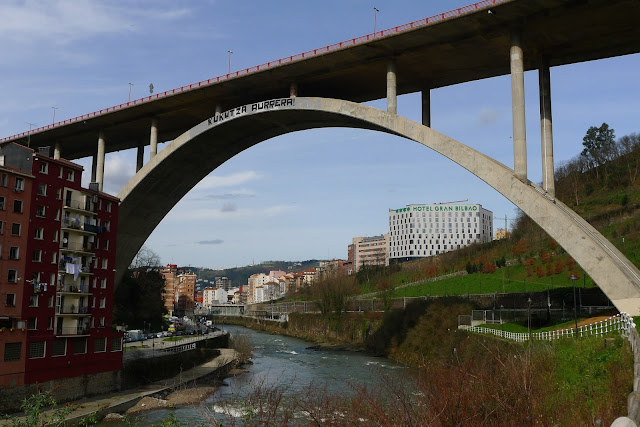 |
| the skyline in pau |
"Pau has the world's most beautiful view of the earth
just as Naples has the most beautiful view of the sea."
French poet
Alphonse de Lamartine used these words to describe Pau, and while I tend to be wary of superlatives, I think he put it best. As the bus approached Pau and the Pyrenees grew on the horizon, I thought that even if we turned around before we'd arrived the sight alone would have still been worth the trip. I have visited the Pyrenees region before, but Pau's view, especially from the aptly named Boulevard of the Pyrenees, is beautiful.
The city of Pau is more difficult to describe. "It's so cute!" I overheard another enthusiastic twenty-something behind me squeal in English as the bus pulled up, before she quickly amended her opinion to "Well, actually it's kind of dirty." I smiled as I eavesdropped, although, she had a point, I thought while contemplating my own ideas through the windows.
This was my second adventure to the Basque region of France, and also my second trip with a group called "Los planes de Cloe," even though the plans are actually organized by a nice lady called Amaya. She posts little white fliers all over Bilbao, and then curious passersby like me sign up, along with a growing number of "regulars." It's a fun way to see France through Spain's eyes, and it also allows a good mix of freedom with order since the only organized parts of the trip are the timetable and the bus ride, when maps and practical information are distributed along with insider tidbits, like how
the coffee in France is bad.
This trip it was not the terrible coffee that was stressed (although it was mentioned), but a warning about eating lunch. Sure, the food is probably good. But the schedule is different: The French eat very early, Amaya explained. At around noon. And the service is horrible. That's right, in Spain they think the service is bad in France.

Pau is a city of blues and greens and yellows pinks, which all fade to white in muted shades tainted by dust. The effect is charming, if perhaps a bit dirty. Notice how all of the buildings are only a few stories high, Amaya instructed the bus full of Spaniards, and how many of the windows have shutters. And sometimes they use stones from the river to decorate the fronts of the houses, not just the streets. I did as she said, wondering at how the narrow windows and angular roofs gave an impression of towering height, even if they were much shorter than the apartment blocks in Bilbao. I am always amazed at how a few hours drive can reveal different worlds.
When we were set loose, I focused my day on sampling cheeses at Pau's huge farm market building, nibbling on pastries at every opportunity, and browsing the stalls that crowded the streets.
 |
| the braderie market |
While many people on the bus came for the braderie, the end-of-the-season sales that take to the streets of France as a giant market, the main attraction in Pau is certainly the castle. It's called a castillo in Spanish, but it's also called a château, leaving me a little lost in French translation and guessing at its identity, which is perhaps something of both.
Built in the middle ages and constantly evolving in the years since, the
château de Pau became home to the monarchy of the kingdom of Navarra, which includes much of present-day Spain and Basque Country, during the time of the Renaissance.
Its best-known resident was
Henry IV, who was king of Navare and then of France. He is known for leading religious battles and for signing the
Edict of Nantes, although his several wives and many lovers also earned him recognition. Henry was born in the elegant
château and had a unique cradle carved from a tortoise shell (which, with my luck, was on loan to the Louvre). The extent of both his connection to the castle and to extravagant living ends there, however, as he was then brought up more austerely in the countryside. Although their connection was brief, Henry's fame and that of the castle remain intertwined.
Other famous residents include Napoleon, and Marie Antoinette, whose legacy was the castle's garden.
 |
| the château de pau |
 |
| pau castle |
Pau also offers another lesser-known château, the château de Franqueville, which is located a bit farther out of town where the Henry IV hiking trail begins--a trail that, after eight hours of walking, will lead you all the way to Lourdes. Always attracted to both hiking trails and the edge of town, I wandered my way there in the afternoon and was not disappointed (I may have even hummed the Disney tune "Adventure in the Great Wide Somewhere"). Locals seemed to have the same idea, as the grounds were dotted with blankets where families, friends, and couples spread out to appreciate the view.
Pau, I hope we meet again someday.
 |
| the view from the château de franqueville |
 |
| chemin henri iv |
 |
| a view of pau |









































